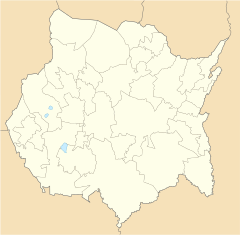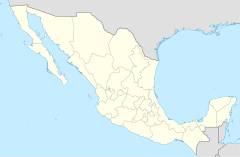Huitzilac facts for kids
Quick facts for kids
Huitzilac
|
||
|---|---|---|
|
City
|
||
|
||
| Country | Mexico | |
| State | Morelos | |
| Elevation | 2,561 m (8,402 ft) | |
| Time zone | UTC-6 (Zona Centro) | |
Huitzilac is a city located in the Mexican state of Morelos. It sits high up, about 2,561 meters (8,402 feet) above sea level. The city is the main town for the area, also called Huitzilac.
In 2010, Huitzilac had a population of 4,568 people. It was the second-largest town in its area. The name "Huitzilac" comes from an old language called Nahuatl. It means "in the water of the humming-birds."
Contents
The Municipality of Huitzilac
The municipality of Huitzilac is one of 17 areas that share a border with Mexico City. It touches the southern parts of Mexico City, including areas like Milpa Alta and Tlalpan. In 2015, the whole municipality had about 19,231 people living there.
Main Towns and Villages in Huitzilac
Here are the largest towns and villages in the Huitzilac municipality, based on the 2010 census:
| Name | 2010 Census Population |
|---|---|
| Tres Marías | 6,160 |
| Huitzilac | 4,568 |
| Coajomulco | 2,089 |
| Real Montecassino | 364 |
| Fraccionamiento Sierra Encantada | 349 |
| Total Municipality | 17,340 |
A Look at Huitzilac's History
Huitzilac has a long and interesting past.
Early History and Spanish Arrival
Before the Spanish arrived in 1521, Huitzilac was part of a larger area called Cuahanahuac (now Cuernavaca). After the Spanish conquest, it became part of a big land grant called the Marquesado del Valle de Oaxaca.
Huitzilac was an important stop for stagecoaches traveling between Mexico City and Cuernavaca. This changed when a railroad was built in 1897.
Huitzilac During the Mexican Revolution
During the Mexican Revolution (around 1910-1920), Huitzilac was a place of conflict. In April 1912, the town was burned. A leader named General Genovevo de la O fought against the government in this area. He gathered many fighters to help free Cuernavaca.
A Historical Event in 1927
On October 3, 1927, a sad event happened near Huitzilac. A presidential candidate named Francisco R. Serrano and several of his friends were killed. Iron crosses were put up at Km 47 on the Mexico City-Cuernavaca highway to remember them.
Recent Times and the COVID-19 Pandemic
In 2012, an incident involving two agents happened in Tres Marías. Years later, in 2019, some police officers were sentenced for their involvement.
Like many places, Huitzilac was affected by the COVID-19 pandemic. Schools and many businesses closed in 2020 to help stop the spread of the virus.
Fun Places to Visit in Huitzilac
Huitzilac and its surroundings offer many cool spots for visitors!
- Tres Marías: This mountain town is famous for its restaurants. It's also a popular spot for motorcyclists, especially on weekends.
- Chichinautzin Biological Corridor: This is a protected natural area. It has many different types of plants and animals because of its special location and climate. You can find 315 kinds of fungi, 10 types of amphibians, 43 types of reptiles, and 237 kinds of birds here! It also has beautiful pine, oyamel, and oak forests.
- Lagunas de Zempoala National Park: This park is great for outdoor activities. You can fly kites, go hiking, camp, and even ride horses.
- Local Food: Don't miss trying Barbacoa (barbecue mutton) and pulque. Pulque is a traditional drink made from fermented agave.
- Iglesia de San Juan Bautista: This old church was built in 1623. It's a historic building and a place where two festivals are held each year: on June 24 and September 1.
- La Pera lookout: This viewpoint is on the Mexico City-Cuernavaca tollway. It offers amazing views.
- Handicrafts: Huitzilac is known for its beautiful wooden furniture made by local craftspeople.
- Los Columpios (The Swings): This park is fun for everyone. It has rope swings, and you can picnic or camp there. You can also rent ATVs or try a zip-line.
- Monument to José María Morelos: This monument honors a hero of Mexican Independence. It's located on the highway between Mexico City and Cuernavaca.
Culture and Traditions
Huitzilac has rich cultural traditions and celebrations.
Important Festivals
The most important festival in Huitzilac is on March 19. It honors the town's patron saint, San José. There's also a festival on September 1 to remember when an image of St. Joseph was found after being lost during the Mexican Revolution.
Other celebrations include:
- During Holy Week (March or April).
- In honor of Our Lady of Guadalupe on December 12.
- The Holy Trinity is celebrated in a place called Fierro del Toro on January 1.
- San Buen Aventura is celebrated on July 15 in Coajomulco.
- St. Joseph is also honored in Tres Marias on March 19.
Local Traditions
People in Huitzilac prepare traditional drinks like pulque and cured fruit drinks. Local artists create beautiful wooden furniture. During festivals, you might see Chinelos dancers, who wear colorful costumes and masks.
Geography of Huitzilac
Huitzilac covers an area of about 190 square kilometers (73 square miles). This is about 3.84% of the entire state of Morelos. The average height of the land is 2,500 meters (8,200 feet) above sea level.
Climate
Huitzilac has a subtropical humid climate. This means it's generally warm and wet, with a clear winter season. The average temperature each year is about 12°C (53.6°F). It gets a lot of rain, about 1,358 mm (53.4 inches) per year.
Terrain and Mountains
The area around Huitzilac is very mountainous. Many peaks are 2,250 meters (7,380 feet) or higher. Some of the notable mountains include:
- Volcán Ocotecatl, 3,480 m (11,417 ft)
- Sierra Chichinautzin, 3,470 m (11,398 ft)
- Volcán Chalchihuites, 3,440 m (11,286 ft)
- Cerro de Tres Marías, 3,280 m (10,761 ft)
- Volcán Cuespalapa, Tres Marias, 3,270 m (10,728 ft)
- Cerros de Tepeyahualco and Tuxtepec, both over 3,250 m (10,663 ft)
- Cerro de la Manteca, 3,200 m (10,500 ft)
- Cerro de Tezoyo, 3,180 m (10,433 ft)
- Cerros de Zacolocohaya, del Mirador, de Piedra Quila, de Zempoala, and de Ojo de Arezacapa, all over 3,000 m (9,840 ft)
Lakes and Rivers
The famous Lakes of Zempoala are found here. There are also several streams that flow only at certain times of the year.
Soil and Land Use
The land in Huitzilac is used for different purposes:
- About 3,035 hectares (7,500 acres) are used for farming.
- About 3,051 hectares (7,539 acres) are used for fishing.
- About 7,002 hectares (17,302 acres) are covered by forests.
Land ownership is divided into:
- 440 hectares (1,087 acres) are ejidos (community-owned land for farming).
- 19,388 hectares (47,909 acres) are communal property.
- 9,693 hectares (23,952 acres) are private land.
Flora and Fauna: Plants and Animals
The plants in Huitzilac are mostly oak and pine trees, forming beautiful forests.
The animals you might find include:
- Mammals: White-tail deer, raccoons, skunks, squirrels, volcano rats, and even mountain lions.
- Birds: Quail, mountain hens, woodpeckers, blue magpies, and goldfinches.
- Reptiles and Amphibians: Rattlesnakes, garter snakes, frogs, and lizards.
- Fish: Trout live in the streams.
See also
 In Spanish: Huitzilac para niños
In Spanish: Huitzilac para niños
 | Janet Taylor Pickett |
 | Synthia Saint James |
 | Howardena Pindell |
 | Faith Ringgold |




